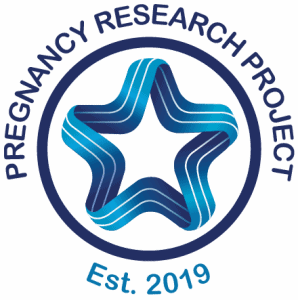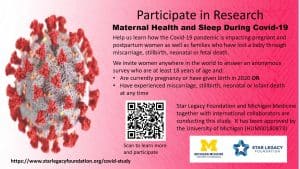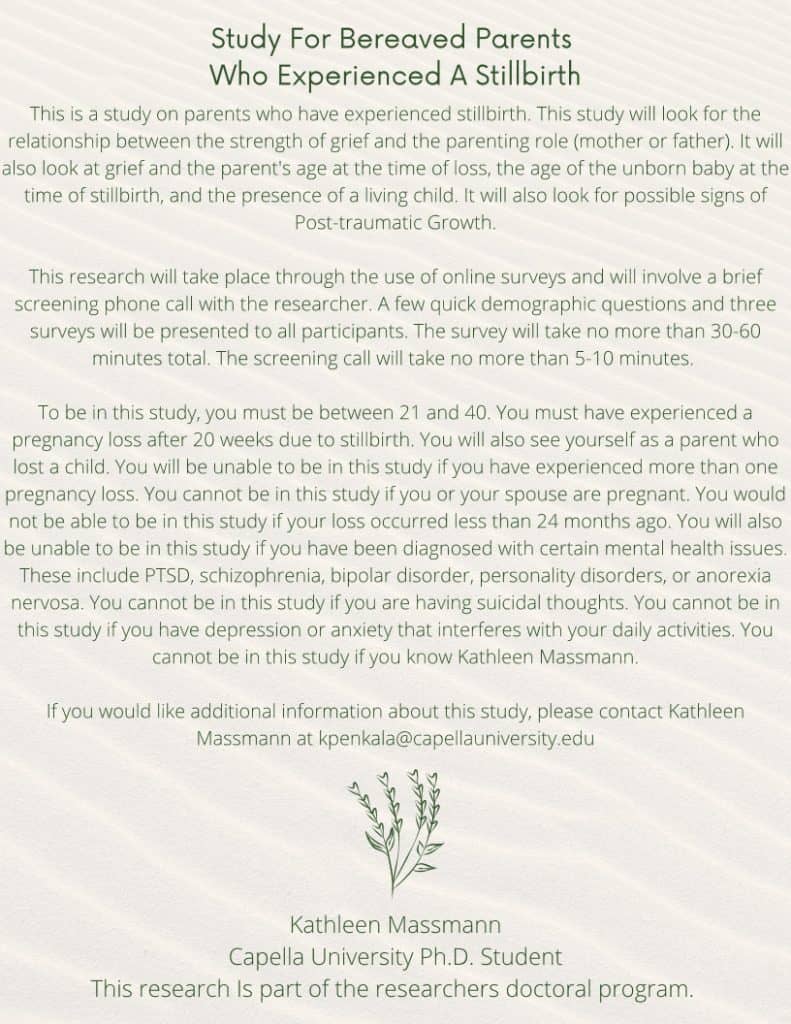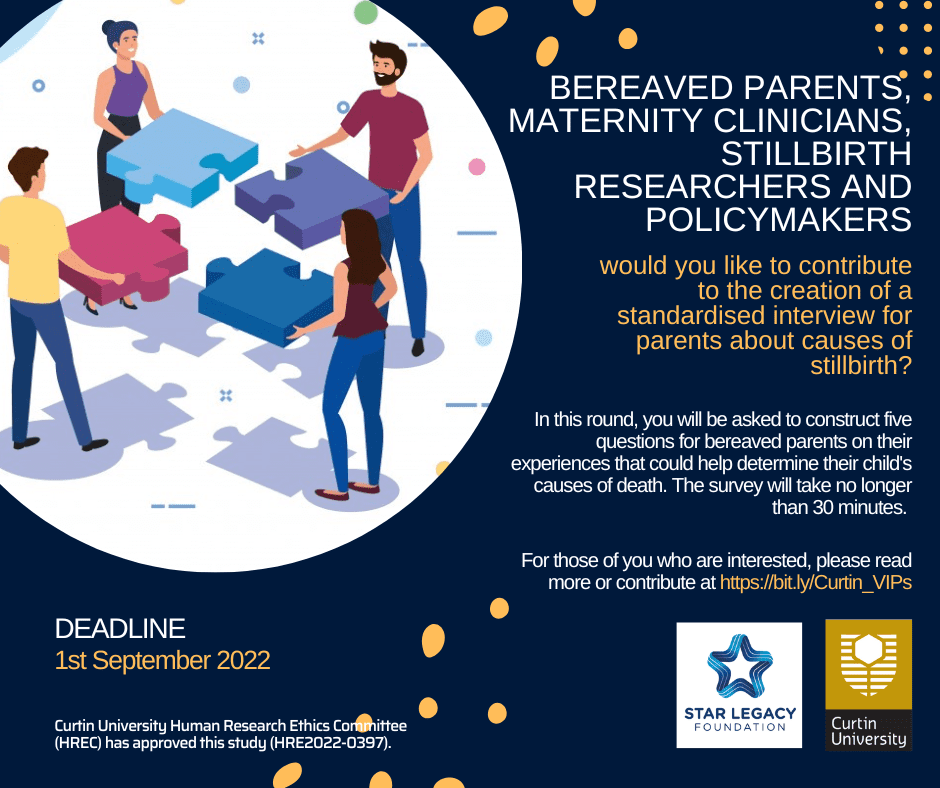Click here to learn more and enroll in the Pregnancy Research Project
 Star Legacy Foundation is very excited about our newest and largest project! Launched at the Stillbirth Summit in June of 2019, this endeavor holds great promise to learning more about stillbirth risks and management techniques to avoid these terrible tragedies.
Star Legacy Foundation is very excited about our newest and largest project! Launched at the Stillbirth Summit in June of 2019, this endeavor holds great promise to learning more about stillbirth risks and management techniques to avoid these terrible tragedies.
Mothers are eligible to participate who are currently at least 18 years of age when participating. She may participate once for each of her pregnancies that meet any of the following criteria:
The Pregnancy Research Project is designed to allow women to contribute the information about that pregnancy to science! The first part part is a maternal survey designed to document aspects of the pregnancy and mother’s experience that are not reflected in the medical records. The second part will include a review of the prenatal, delivery and postnatal and newborn medical records.
This wealth of information will allow researchers to request and collect certain data points from eligible women without the time and expense of finding and enrolling them individually. Any pregnancy could potentially provide valuable information for dozens of research studies! All data will be de-identified to protect the privacy of the individuals who enroll.
. Contact us at [email protected] for more information.
This study is funded by Star Legacy Foundation.
To participate scan code below or CLICK HERE
 Accordion Content
Accordion Content
The Stillbirth Summit is a unique medical conference focused on issues around stillbirth and related perinatal losses. The roundtable format encourages dialogue amongst the panel of researchers from around the world. Our final session involves a workshop involving all participants to think ‘outside the box’ and collaborate on projects that will improve efforts toward stillbirth prevention. Researchers, health professionals, and families are all welcome to join us in “Partnering for Prevention”.
Three Stillbirth Summits have been held (2011, 2014, 2017 and 2019). Read the proceedings from these conferences below:
Proceedings of the Stillbirth Summit 2011 (PDF)
Proceedings of the Stillbirth Summit 2014 (PDF)
The next Stillbirth Summit will be held in June of 2021. Contact us for more details as they are available including the Call for Abstracts, Registration, and Sponsorship and Exhibitor Opportunities.
The Study of Trends and Associated Risks for Stillbirth (STARS) Study was created by an international team of researchers and conducted in 2012-2014. The goal of this project was to quantify the experiences of many mothers who have had stillborn babies in order to provide appropriate data for researchers. The need for this study was identified during the first Stillbirth Summit in 2011.
The STARS Study was a Cohort study design with nested case-control arm. The cohort was: 1,713* unique women who had experienced a stillbirth >3 weeks prior to enrollment. Case-control: 153 unique cases who had a stillbirth ≤ 3 weeks prior and 480 unique controls who had had a recent live birth or who were still pregnant.
Data Availability
The raw clean data from the STARS cohort and case-control study are held on Excel spreadsheets by Star Legacy Foundation. Members of the STARS consortium can now request specific data from this dataset from Star Legacy Foundation. This process will enable a record of who has the data and broadly what it will be used for in order to minimize potential duplication of publication and maximize collaboration between consortium members.
The database is not currently available outside of the consortium members. Consortium members are asked to complete the “Application for Use of Data from the STARS study”
* The report of the main findings from the cohort indicate that there were 1714 participants but on finalizing the database ready to be made available an additional duplicate entry was found and removed making the new number of participants 1713.
Analysis & Findings
Analysis of the data continues and the researchers are presenting their findings in journals and at conferences around the world:
Follow-up studies are being planned that will further investigate the results of the STARS Study. Visit this site in the future for updates on these research projects and opportunities to participate.
Needs Assessment Study
A research team at Star Legacy Foundation conducted a research study of parents who have experienced a stillbirth and health professionals who work with families experiencing perinatal death. The aim is to identify what parents need from the time they learn their baby has died or will not survive through the first two months after the baby’s death. This study was being conducted in Minnesota. Phase two will repeat the study in other states in the future. NOTE: This study is currently on hold due to the illness of the principal investigator.
This project is funded by Star Legacy Foundation.
Saving Babies Lives Care Bundle

Star Legacy Foundation and Ariadne Labs partnered to reduce the rate of stillbirth in the U.S. The mission of the Foundation is to increase awareness, support research, promote education, and encourage advocacy and family support regarding stillbirth, pregnancy loss, and neonatal death.
Based on compelling work in the United Kingdom and Australia, Star Legacy Foundation’s goal is to implement best practices in the United States. The leaders at Star Legacy are seeking to establish a Learning Network/Collaborative to reduce the rate of stillbirth by 15% for 20-30 innovative organizations.
In the News
This project is funded by Star Legacy Foundation and generous donors.
Maternal Health and Sleep During Covid-19
 Star Legacy Foundation and Michigan Medicine, together with international collaborators, are conducted an anonymous online survey to learn how the Covid-19 pandemic is impacting pregnant/postpartum women as well as families who have lost a baby through miscarriage, stillbirth, neonatal or fetal death.
Star Legacy Foundation and Michigan Medicine, together with international collaborators, are conducted an anonymous online survey to learn how the Covid-19 pandemic is impacting pregnant/postpartum women as well as families who have lost a baby through miscarriage, stillbirth, neonatal or fetal death.
This study is funded by Star Legacy Foundation.
=============================================================
Aroaches to Stillbirth Prevention: Maternal Sleep Position

=============================================================
Study for Bereaved Parents Who Experienced A Stillbirth


Bereaved parents, maternity clinicians, stillbirth researchers or policy makers anywhere around the world – We invite you to participate in this study to create a standardised interview for parents about stillbirth to explore factors that contribute to stillbirth.
This study is phase one of a two-part study. In this phase, we will use a 3 round ‘Delphi’ approach to identify and rank the best questions to ask bereaved parents. We will be forming an international expert panel consisting of parents, maternity care provider clinicians, and researchers to gain consensus on which questions are important to ask parents following their baby’s stillbirth to help identify the baby’s cause of death. This phase is run by a group of researchers from Curtin University.
Each round may take up to 30 minutes. However, you may choose to participate in any rounds or all three rounds of this study. Phase two involves piloting the created interview schedule for newly bereaved parents, which will not be a part of this survey.
We are currently running the FIRST round. In round one, you will be given the question, “If you could ask five questions of a bereaved parent about their experiences leading up to their baby’s death, to help determine the cause of death, what would those questions be?” You will then be asked to write your five questions using one of the comment boxes per question. If you do not feel able to compose a question, you can choose to join the study for round two.
Click here to read more or to contribute https://bit.ly/Curtin_VIPs
Curtin University Human Research Ethics Committee (HREC) has approved this study (HRE2022-0397).
This study is funded by Star Legacy Foundation.

Star Legacy Foundation. All Rights Reserved. Privacy Policy Disclaimer
Registered 501(c)(3) EIN: 26-0227601